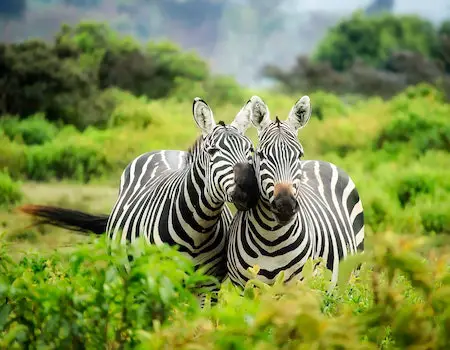In the case of a safari, choosing the right binoculars can be a crucial decision. If you’re going to Rwanda to hunt, you might want to know which are the best to take along. You’ll also need to know how to choose the correct magnification for the trip.
Make sure to check out these other helpful articles too!
How to choose binoculars for hunting in Rwanda?
A binocular is a fancy term for a camera lens that magnifies what you see. This is a necessary evil on an African safari. The good news is that there are plenty of high-powered alternatives to the clunky binoculars of yore. Choosing the right binocular for the job will make for an all-around happy hunter.
The best way to find out is to test a few different models before making the big buy. You should also be aware that the best ones aren’t always the cheapest. As a rule of thumb, binoculars with an eyepiece diameter of 50mm or more are more than adequate. For those with a larger budget, there are a number of manufacturers that offer top-of-the-line options. In fact, you might even get lucky and pick up a set of Swarovski Optik CL Companions at Sabi Sand Game Reserve.
If you’re in the market for a new pair of binoculars, there are a few items on your must-have list. First, you’ll need the aforementioned BAK-4 prisms and a solid multicoated lens. Having said that, you’ll probably want to get a pair of binoculars with a 42/50/52 mm objective. Keeping these points in mind will help ensure that you spend your hard-earned money on the highest fidelity optics. To round out the package, you’ll likely need a couple of tees to keep the glass safe and sound.
What are the best binoculars for an African safari
If you want to experience an African safari, you’ll need to make sure you get binoculars that are suitable for your needs. These tools help you spot animals at a distance and give you a detailed view of the landscape and animals in the area. You’ll need to choose a pair that is durable and waterproof.
One of the biggest things to consider when choosing safari binoculars is the magnification. A pair with 10x or more will let you see the details of animals, such as the snout of a giraffe, at a much closer distance. However, high-magnification models will limit your field of view and cause image shake.
Another important feature is the objective lens diameter. For a good view, you should use binoculars with an objective lens that is at least 30 millimeters. The larger the size of the objective lens, the more light will be entering the binoculars.
Safaris are often conducted on off-road terrain, so a pair with a rubber outer layer is an essential feature. This rubber layer provides shock absorbency and helps you grip the binoculars.
Another important feature to consider is rubber eye relief. Some of the best binoculars have adjustable eye relief. When viewing at night, a pair with an eye relief of at least ten millimeters is ideal.
To ensure that your binoculars are water resistant, look for a model that is 100% waterproof. You’ll also need to ensure that the lenses are purged with nitrogen to prevent fogging.
What magnification binoculars for hunting?
Binoculars are a great tool for wildlife viewing. They let you see an object ten times closer than it actually is. A good pair of binoculars will provide a clear image and a steady view. However, not all binoculars are created equal. If you are looking for the best binoculars, you need to know a few things about magnification.
When it comes to binoculars, there are three different types. These are low power, mid power, and high power. Each one has a number that identifies the magnification level. The higher the magnification, the narrower the field of view.
Low-power binoculars are more portable and allow you to have a wider field of view. This is particularly useful for bird watching. Ideally, you’ll want to use binoculars with a power of six or eight.
A binocular with a 10x magnification will allow you to see an object ten times closer than it really is. Although it may seem like a good idea, the difference in magnification doesn’t mean that you’ll have a better view.
High-power binoculars are designed to withstand the elements. Some models are waterproof, and others are equipped with multi-coated lenses. These features are often quite expensive. Regardless of the type of binocular you purchase, you’ll need to check the details of the lenses to be sure they’re in good shape.
You’ll also need to consider your hunting style. The type of terrain you are hunting in will affect the kind of binoculars you need. For example, if you’re hunting in a densely vegetated area, you won’t need as large of a binocular. In contrast, if you’re in a wide open space, you’ll need a larger model.
Is there hunting in Rwanda?
The Rwandan Patriotic Front, a group of Tutsi exiles, invaded Rwanda in 1990. The group planned to oust the then-president, Mobutu Sese Seko, and overthrow his government.
However, Hutu militias attacked their opponents and killed many people. As a result, tens of thousands of Tutsi fled to neighboring countries.
In response, the United Nations Assistance Mission in Rwanda was dispatched. However, the mission was months behind schedule. It was not given the mandate to stop the killings.
Nevertheless, the UN was aware of the imminent danger. In order to provide protection, the mission set up a peacekeeping force in the country.
In addition, they also provided firearms to selected civilians, including political party leaders. These guns were used to kill government opponents and their families.
Rwanda is home to a number of wildlife species. Some of the most popular are elephants, buffalo, lions, hippos, and rhinoceros.
There are also various savanna and forest birds in the country. This is one of the reasons why Rwanda is a good destination for bird lovers.
There are several different national parks in Rwanda, and the majority of the wildlife in these parks is prey animals. Predators such as leopards and lions are also well-represented in the country.
Akagera National Park, which is located in the northeast of Rwanda, is known for its big five animals. During the genocide, a plane carrying a group of Hutu leaders was shot down.
Can foreigners hunt in South Africa?
If you are interested in hunting in South Africa, it is important to understand the laws and regulations governing the industry. The government has put together legislation that sets standards and defines the requirements for hunters and outfitters.
There are two classes of hunters: local and foreign. Local hunters make up the bulk of the hunting population, but there are also a number of trophy hunters who regularly travel to the country.
Whether you are a tourist or a foreigner, you need to obtain a license before going hunting. You will also need an import permit from your home country.
A veterinary health certificate will be issued by the official veterinarian in your area. Your hunt will only be allowed to take place in a protected area.
Depending on the type of animal you wish to hunt, you may need a veterinary movement permit. These can be issued by your local State Veterinarian or Regional Veterinarian.
While hunting in South Africa is possible, you may encounter unexpected diseases. Most parts of the country are malaria-free, but a rainy season or a summertime heatwave can increase the risk of malaria.
You should always check with your outfitter about the rules of the game. For instance, if you want to hunt lions, you’ll have to get a permit.
Other animals that are considered worthy of note include elephants and buffalo. The largest antelope in the world, the elephant, is re-introduced into areas where it hasn’t been seen in over a century.
Where is the best hunting in Africa?
The top hunting destinations in Africa offer a wide variety of game animals and terrain. For instance, the Kalahari is a great place for plains game hunting. This area is characterized by grassy plains, acacia or mopane forests, and thorn bush.
Southern Africa is another of the best places to hunt in Africa. The region is home to some of the continent’s best game reserves. Here, you’ll find plenty of exotic species and the continent’s most recognizable predators.
Mozambique is an underrated destination for hunters. The country’s rich, diverse landscape offers forest glades and green savanna, making it perfect for dangerous game hunting. Fortunately, the local government is investing in infrastructure and making a positive impact on wildlife.
Among the most impressive aspects of Southern Africa’s safari industry is the sheer number of animals that are available to you. This is especially true when you’re talking about Big Five hunting.
While most of the hunting in South Africa takes place on private, enclosed land, there are a few areas where you can hunt for trophy class animals. These include the Private Nature Reserves that border the Kruger National Park.
Southern Africa is one of the most popular hunting destinations in the world, and for good reason. It is a safe and affordable place to go. And, with its large number of animal populations, there are plenty of opportunities to harvest a worthy trophy.

